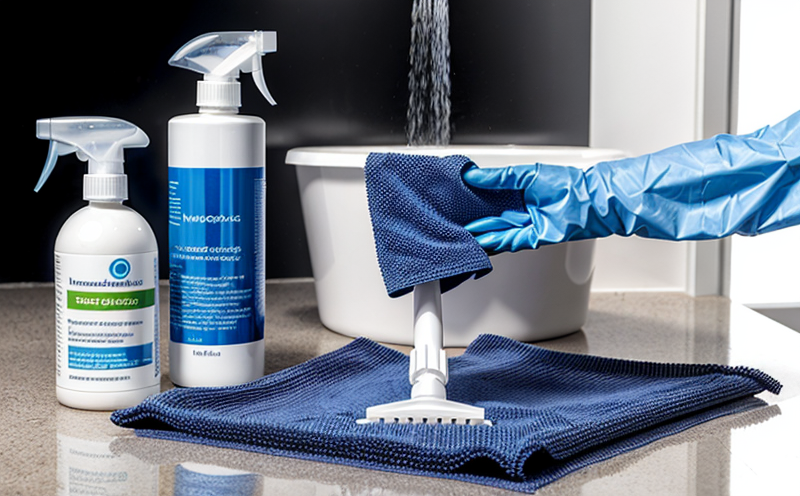ISO 19008 Testing of Recycled Plastic Cleaning Containers with Nanomaterials
The ISO 19008 standard provides a framework for the testing and evaluation of nanomaterials used in various applications, including cleaning and hygiene products. This service focuses specifically on recycled plastic containers designed for cleaning purposes, where nanomaterials are incorporated to enhance performance such as durability, recyclability, or antimicrobial properties.
The process involves several key steps, starting with the selection of appropriate nanomaterials that meet the functional and safety requirements. Recycled plastics present unique challenges due to their complex composition, which can vary widely depending on the source materials used in recycling processes. Incorporating nanomaterials into these containers requires precise control over dispersion techniques to ensure uniform distribution within the polymer matrix.
Once selected, nanocomposites undergo rigorous characterization using advanced analytical methods like transmission electron microscopy (TEM), dynamic light scattering (DLS), and X-ray diffraction (XRD) to confirm their structural integrity. For recycled plastics, this step is crucial as it helps identify any potential compatibility issues between the recycled matrix and the new nanomaterials.
The testing protocol outlined in ISO 19008 ensures that all aspects of the nanocomposites are thoroughly examined, including mechanical properties (tensile strength, flexural modulus), thermal stability, chemical resistance, and biological performance if antimicrobial properties are desired. These tests provide critical data needed to assess whether the modified container meets industry standards for safety and efficacy.
Specimen preparation plays a vital role in ensuring accurate testing results; therefore, it follows strict guidelines provided by ISO 19008. This includes standardizing sample size and shape according to specific test requirements while maintaining consistency across all samples being tested. Properly prepared specimens allow for consistent measurement of key physical attributes such as impact resistance or scratch hardness.
The testing equipment used must also adhere strictly to specified criteria laid out in ISO 19008, ensuring that the measurements obtained are reliable and repeatable. This includes precise control over temperature settings during thermal cycling tests, accurate calibration of mechanical testers for tensile strength measurements, and appropriate dilution factors when conducting antimicrobial efficacy assays.
After completing all necessary evaluations, detailed reports are generated summarizing findings from each aspect of the ISO 19008 testing procedure. These documents serve as valuable resources not only for regulatory compliance but also for ongoing R&D efforts aimed at improving product quality and sustainability through innovative nanotechnology applications.
| Test Parameter | Description |
|---|---|
| Tensile Strength | Measure the maximum stress a material can withstand before breaking. |
| Flexural Modulus | Determine how much a material will deform under load without losing its shape. |
| Thermal Stability | Evaluate the temperature at which materials begin to degrade or lose their physical properties. |
| Chemical Resistance | Assess how resistant the nanocomposite is to environmental factors like humidity and chemical exposure. |
Customer Impact and Satisfaction
By offering ISO 19008 testing services for recycled plastic cleaning containers containing nanomaterials, we help our customers meet stringent regulatory requirements while enhancing product performance. Our comprehensive approach ensures that each container meets not only current standards but also future expectations regarding sustainability and safety.
This service has direct benefits for quality managers who can rely on accurate testing data to make informed decisions about material selection and process optimization. Compliance officers gain peace of mind knowing their products comply with relevant international standards, thus reducing potential risks associated with non-compliance penalties or recalls.
R&D engineers benefit from detailed insights into how different nanomaterials behave within recycled plastic matrices, enabling them to innovate more effective solutions tailored specifically for cleaning applications. Procurement professionals appreciate having reliable test results that support vendor selection processes by ensuring consistent quality across suppliers.
International Acceptance and Recognition
The ISO 19008 standard enjoys widespread acceptance among manufacturers globally, particularly those focused on environmental responsibility and product safety. By adhering to these guidelines during development stages, companies demonstrate their commitment to producing high-quality products that are both safe for users and environmentally friendly throughout their lifecycle.
Many countries have adopted ISO 19008 as part of their national regulations or industry practices, further emphasizing its importance in the global market. This recognition contributes significantly towards building trust among consumers who value transparent labeling regarding product components and manufacturing processes.





